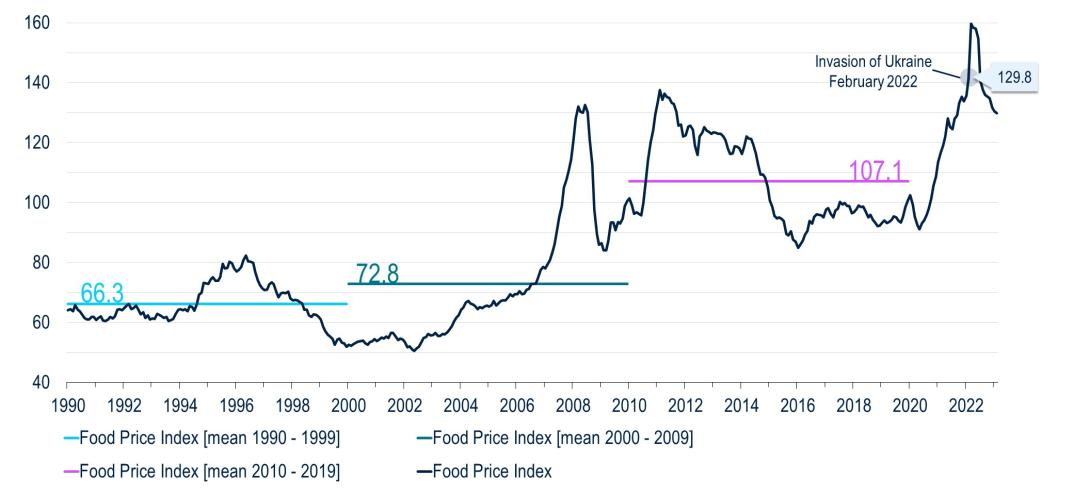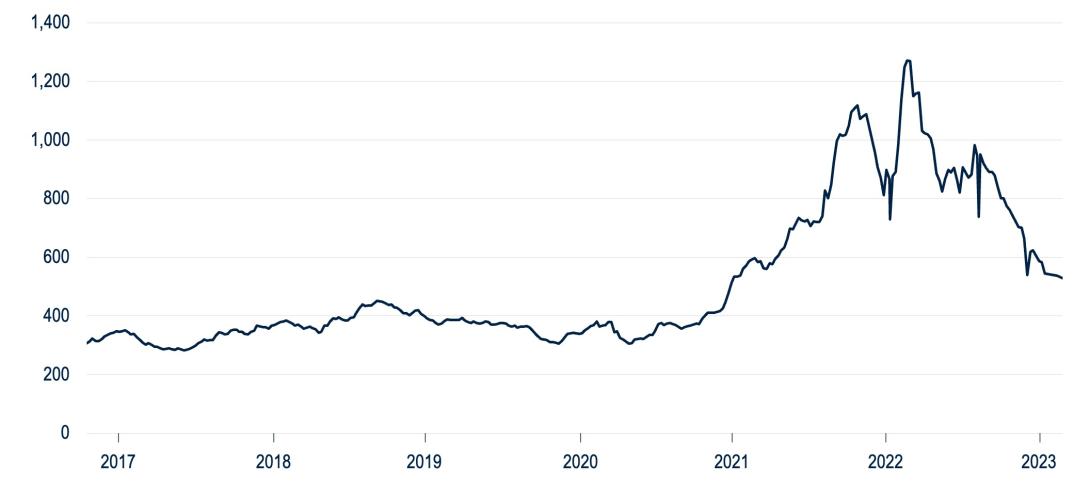No Country Thrives on an Empty Stomach

Last year we looked at emerging markets’ vulnerability to rising food prices and political instability. That was mere weeks before Russia invaded Ukraine, starting awar that has reshaped global food supply chains.
Since then, rising food prices have fueled discontent around the world, sparking demonstrations in Pakistan, Ecuador, India, and many other countries.1 In this follow-up, we update our analysis on food prices and incorporate countries’ unemployment numbers using a misery index.
Food and fertiliser prices have fallen from their recent peaks (Figures 1a and 1b). However, both remain at historical highs, because Russia and Ukraine are major food exporters, and Russia and Belarus are major fertiliser producers. The geopolitical situation remains tense. Moreover, volatile oil prices and increasingly uncertain weather have raised the cost of producing and transporting food.
Figure 1A: Food and Agriculture Organization of the United Nations (FAO) World Food Price Index

Source: Macrobond.
Figure 1B: Green Market North America Fertiliser Price Index (in U.S. dollar)

Source: Macrobond.
In recent months, most analysts and investors have focused on the inflationary impact of rising food prices. This impact has been particularly strong in emerging markets, where food is a larger part of the consumption basket than in developed markets.
If food prices stabilize or fluctuate around current values, their impact will gradually drop out of inflation data. However, the level of food prices is set to remain much higher than in recent years, which is eroding purchasing power.
Households can only recover this lost purchasing power if their income growth accelerates, an unlikely development as EM economies slow in coming months. As a result, higher food prices imply lower food affordability and lower food security, even if inflation stabilises.
This combination of high prices, low or slowly rising incomes, and uncertain or decreasing food security is a recipe for social discontent. Ultimately, it may cause governments to loosen their fiscal stances, renegotiate the national debt or, in an extreme case, be replaced.
Our analysis aimed to identify which countries are most vulnerable to social challenges under these conditions.
First, we calculated a new index capturing inflation, unemployment, and food insecurity. Then, we plotted that new index against the World Bank’s Political Stability & Absence of Violence/Terrorism metric, which measures each country’s vulnerability to social unrest.2
Figure 2
First, we calculated each country’s “misery index” as the sum of a country’s most recent unemployment and inflation rates. A higher misery index value represents a more challenging economic situation.3
This incorporates a measure of labour market strength into our earlier analysis because higher unemployment presents a social challenge that can translate into political unrest.
Then, we used the Economist’s Global Food Insecurity Index to measure how precarious food availability is in each country.
Next, we normalized both the misery index and the food insecurity index to values between 0 and +1, and took the average of the two. The misery index and the food security index are measured on inverse scales, so we subtracted the normalised food security index from 1. In that way, the higher the sum of the two, the worse the combination of food security and economic conditions, as expressed by our new index.
Algebraically:

Figure 3: Combined Misery and Food Insecurity Index versus Political Stability Index

Source: The Economist, Haver.
No clear geographic pattern emerges in the chart, but the “worst” quadrant, top left, contains several Sub-Saharan credits. In this quadrant, high food prices pose significant humanitarian, social, and fiscal challenges. Recent protest in Kenya, for example, highlight these challenges.
By contrast, countries in the bottom-right quadrant have less “misery”, more food security, and more political stability relative to their peers. These credits stand out as potential relative-value opportunities. For example, we consider Costa Rica to be improving as its Fiscal Responsibility Law, in accordance with its IMF programme, continues to improve its credit fundamentals. Qatar also stands out as it continues to benefit from increased demand from natural gas from European buyers.
Our analysis establishes a clear connection between socioeconomic conditions and political stability. We will continue to monitor these dynamics closely as part of our sovereign credit selection process, with particular attention to variables such as food security.
Read More from PGIM Fixed Income
1 Hossain, Naomi and Jeffrey Hallock. Food, energy & cost of living protests, 2022. Friedrich Ebert Stiftung, December 2022.
2 Our sample includes only 47 of the countries in JP Morgan’s EMBI Global Diversified Index (EMBIG D) of hard-currency government bonds, because the Economist’s Global Food Insecurity Index does not cover all of the index’s component countries. EMBIG D countries excluded from The Economist’s Global Food Insecurity Index are: Armenia, Barbados, Croatia, Gabon, Georgia, Iraq, Jamaica, Lebanon, Maldives, Mongolia, Namibia, Papua New Guinea, Suriname, Trinidad & Tobago. We also exclude Argentina and Turkey because their extreme inflation rates distort their misery indexes. Finally, we exclude countries whose governments are in default (Sri Lanka, Ghana, Zambia, Lebanon, Russia, Ukraine). We exclude Rwanda and Honduras due to data availability issues.
3 The economist Art Okun created his "misery index" in the 1960s to assess the U.S. and other developed economies. It remains useful to assess emerging markets although the presence of informal employment may negatively affect the index’s value in emerging markets.
Source(s) of data (unless otherwise noted): PGIM Fixed Income as of March 29, 2023.
For Professional Investors only. Past performance is not a guarantee or a reliable indicator of future results and an investment could lose value. All investments involve risk, including the possible loss of capital.
PGIM Fixed Income operates primarily through PGIM, Inc., a registered investment adviser under the U.S. Investment Advisers Act of 1940, as amended, and a Prudential Financial, Inc. (“PFI”) company. Registration as a registered investment adviser does not imply a certain level or skill or training. PGIM Fixed Income is headquartered in Newark, New Jersey and also includes the following businesses globally: (i) the public fixed income unit within PGIM Limited, located in London; (ii) PGIM Netherlands B.V., located in Amsterdam; (iii) PGIM Japan Co., Ltd. (“PGIM Japan”), located in Tokyo; (iv) the public fixed income unit within PGIM (Hong Kong) Ltd. located in Hong Kong; and (v) the public fixed income unit within PGIM (Singapore) Pte. Ltd., located in Singapore (“PGIM Singapore”). PFI of the United States is not affiliated in any manner with Prudential plc, incorporated in the United Kingdom or with Prudential Assurance Company, a subsidiary of M&G plc, incorporated in the United Kingdom. Prudential, PGIM, their respective logos, and the Rock symbol are service marks of PFI and its related entities, registered in many jurisdictions worldwide.
These materials are for informational or educational purposes only. The information is not intended as investment advice and is not a recommendation about managing or investing assets. In providing these materials, PGIM is not acting as your fiduciary. PGIM Fixed Income as a general matter provides services to qualified institutions, financial intermediaries and institutional investors. Investors seeking information regarding their particular investment needs should contact their own financial professional.
These materials represent the views and opinions of the author(s) regarding the economic conditions, asset classes, securities, issuers or financial instruments referenced herein. Distribution of this information to any person other than the person to whom it was originally delivered and to such person’s advisers is unauthorized, and any reproduction of these materials, in whole or in part, or the divulgence of any of the contents hereof, without prior consent of PGIM Fixed Income is prohibited. Certain information contained herein has been obtained from sources that PGIM Fixed Income believes to be reliable as of the date presented; however, PGIM Fixed Income cannot guarantee the accuracy of such information, assure its completeness, or warrant such information will not be changed. The information contained herein is current as of the date of issuance (or such earlier date as referenced herein) and is subject to change without notice. PGIM Fixed Income has no obligation to update any or all of such information; nor do we make any express or implied warranties or representations as to the completeness or accuracy.
Any forecasts, estimates and certain information contained herein are based upon proprietary research and should not be interpreted as investment advice, as an offer or solicitation, nor as the purchase or sale of any financial instrument. Forecasts and estimates have certain inherent limitations, and unlike an actual performance record, do not reflect actual trading, liquidity constraints, fee. These materials are not intended as an offer or solicitation with respect to the purchase or sale of any security or other financial instrument or any investment management services and should not be used as the basis for any investment decision. PGIM Fixed Income and its affiliates may make investment decisions that are inconsistent with the recommendations or views expressed herein, including for proprietary accounts of PGIM Fixed Income or its affiliates.
Investing in the bond market is subject to risks, including market, interest rate, issuer, credit, inflation risk, and liquidity risk. The value of most bonds and bond strategies are impacted by changes in interest rates. Bonds and bond strategies with longer durations tend to be more sensitive and volatile than those with shorter durations; bond prices generally fall as interest rates rise, and low interest rate environments increase this risk. Reductions in bond counterparty capacity may contribute to decreased market liquidity and increased price volatility. Bond investments may be worth more or less than the original cost when redeemed. Mortgage- and asset-backed securities may be sensitive to changes in interest rates, subject to early repayment risk, and while generally supported by a government, government agency or private guarantor, there is no assurance that the guarantor will meet its obligations. High yield, lower-rated securities involve greater risk than higher-rated securities; portfolios that invest in them may be subject to greater levels of credit and liquidity risk than portfolios that do not. Investing in foreign-denominated and/or -domiciled securities may involve heightened risk due to currency fluctuations, and economic and political risks, which may be enhanced in emerging markets. Currency rates may fluctuate significantly over short periods of time and may reduce the returns of a portfolio. Commodities contain heightened risk, including market, political, regulatory and natural conditions, and may not be suitable for all investors. Diversification does not ensure against loss.
In the United Kingdom, information is issued by PGIM Limited with registered office: Grand Buildings, 1-3 Strand, Trafalgar Square, London, WC2N 5HR. PGIM Limited is authorised and regulated by the Financial Conduct Authority (“FCA”) of the United Kingdom (Firm Reference Number 193418). In the European Economic Area (“EEA”), information is issued by PGIM Netherlands B.V., an entity authorised by the Autoriteit Financiële Markten (“AFM”) in the Netherlands and operating on the basis of a European passport. In certain EEA countries, information is, where permitted, presented by PGIM Limited in reliance of provisions, exemptions or licenses available to PGIM Limited under temporary permission arrangements following the exit of the United Kingdom from the European Union. These materials are issued by PGIM Limited and/or PGIM Netherlands B.V. to persons who are professional clients as defined under the rules of the FCA and/or to persons who are professional clients as defined in the relevant local implementation of Directive 2014/65/EU (MiFID II). In certain countries in Asia-Pacific, information is presented by PGIM (Singapore) Pte. Ltd., a Singapore investment manager registered with and licensed by the Monetary Authority of Singapore. In Japan, information is presented by PGIM Japan Co. Ltd., registered investment adviser with the Japanese Financial Services Agency. In South Korea, information is presented by PGIM, Inc., which is licensed to provide discretionary investment management services directly to South Korean investors. In Hong Kong, information is provided by PGIM (Hong Kong) Limited, a regulated entity with the Securities & Futures Commission in Hong Kong to professional investors as defined in Section 1 of Part 1 of Schedule 1 (paragraph (a) to (i) of the Securities and Futures Ordinance (Cap.571). In Australia, this information is presented by PGIM (Australia) Pty Ltd (“PGIM Australia”) for the general information of its “wholesale” customers (as defined in the Corporations Act 2001). PGIM Australia is a representative of PGIM Limited, which is exempt from the requirement to hold an Australian Financial Services License under the Australian Corporations Act 2001 in respect of financial services. PGIM Limited is exempt by virtue of its regulation by the FCA (Reg: 193418) under the laws of the United Kingdom and the application of ASIC Class Order 03/1099. The laws of the United Kingdom differ from Australian laws. In Canada, pursuant to the international adviser registration exemption in National Instrument 31-103, PGIM, Inc. is informing you that: (1) PGIM, Inc. is not registered in Canada and is advising you in reliance upon an exemption from the adviser registration requirement under National Instrument 31-103; (2) PGIM, Inc.’s jurisdiction of residence is New Jersey, U.S.A.; (3) there may be difficulty enforcing legal rights against PGIM, Inc. because it is resident outside of Canada and all or substantially all of its assets may be situated outside of Canada; and (4) the name and address of the agent for service of process of PGIM, Inc. in the applicable Provinces of Canada are as follows: in Québec: Borden Ladner Gervais LLP, 1000 de La Gauchetière Street West, Suite 900 Montréal, QC H3B 5H4; in British Columbia: Borden Ladner Gervais LLP, 1200 Waterfront Centre, 200 Burrard Street, Vancouver, BC V7X 1T2; in Ontario: Borden Ladner Gervais LLP, 22 Adelaide Street West, Suite 3400, Toronto, ON M5H 4E3; in Nova Scotia: Cox & Palmer, Q.C., 1100 Purdy’s Wharf Tower One, 1959 Upper Water Street, P.O. Box 2380 - Stn Central RPO, Halifax, NS B3J 3E5; in Alberta: Borden Ladner Gervais LLP, 530 Third Avenue S.W., Calgary, AB T2P R3.
© 2023 PFI and its related entities.
2023-2688
Sign Up Now for Full Access to Articles and Podcasts!
Unlock full access to our vast content library by registering as an institutional investor .
Create an accountAlready have an account ? Sign in
